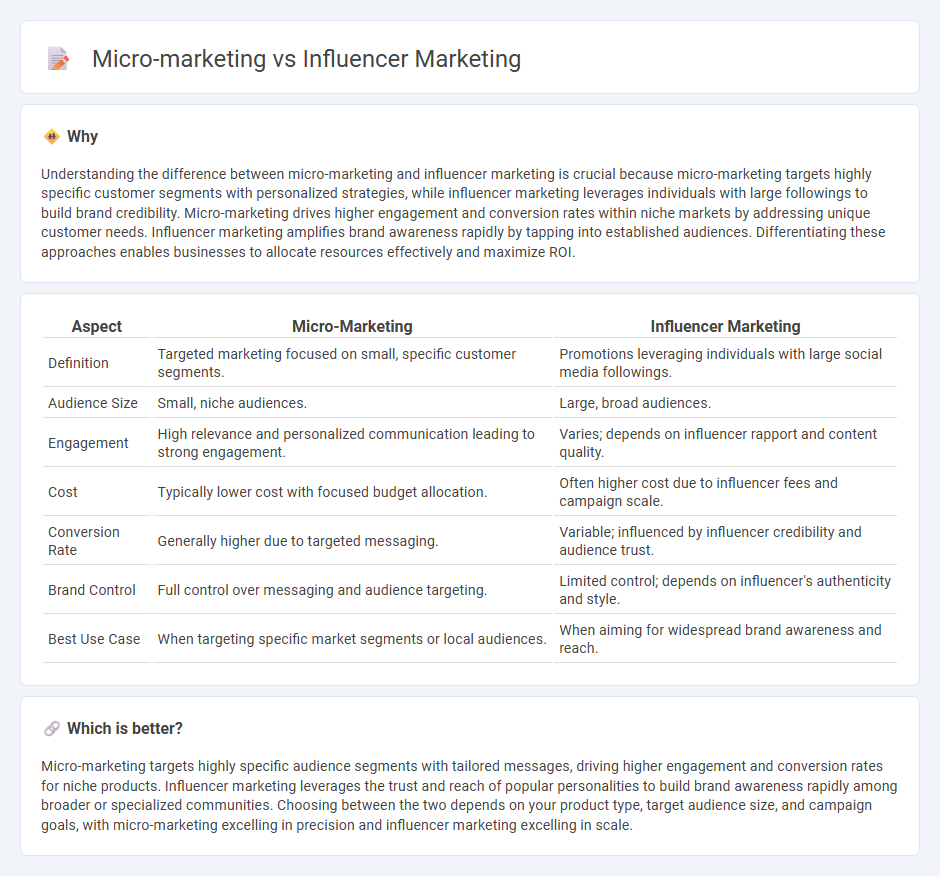
Micro-marketing targets highly specific customer segments to deliver personalized messages that boost engagement and conversion rates, whereas influencer marketing leverages popular personalities to expand brand reach and build trust through authentic endorsements. Both strategies utilize social media platforms but differ in scale and approach, with micro-marketing focusing on niche audiences and influencer marketing appealing to broader followings. Explore these marketing techniques to optimize your sales strategy effectively.
Why it is important
Understanding the difference between micro-marketing and influencer marketing is crucial because micro-marketing targets highly specific customer segments with personalized strategies, while influencer marketing leverages individuals with large followings to build brand credibility. Micro-marketing drives higher engagement and conversion rates within niche markets by addressing unique customer needs. Influencer marketing amplifies brand awareness rapidly by tapping into established audiences. Differentiating these approaches enables businesses to allocate resources effectively and maximize ROI.
Comparison Table
| Aspect | Micro-Marketing | Influencer Marketing |
|---|---|---|
| Definition | Targeted marketing focused on small, specific customer segments. | Promotions leveraging individuals with large social media followings. |
| Audience Size | Small, niche audiences. | Large, broad audiences. |
| Engagement | High relevance and personalized communication leading to strong engagement. | Varies; depends on influencer rapport and content quality. |
| Cost | Typically lower cost with focused budget allocation. | Often higher cost due to influencer fees and campaign scale. |
| Conversion Rate | Generally higher due to targeted messaging. | Variable; influenced by influencer credibility and audience trust. |
| Brand Control | Full control over messaging and audience targeting. | Limited control; depends on influencer's authenticity and style. |
| Best Use Case | When targeting specific market segments or local audiences. | When aiming for widespread brand awareness and reach. |
Which is better?
Micro-marketing targets highly specific audience segments with tailored messages, driving higher engagement and conversion rates for niche products. Influencer marketing leverages the trust and reach of popular personalities to build brand awareness rapidly among broader or specialized communities. Choosing between the two depends on your product type, target audience size, and campaign goals, with micro-marketing excelling in precision and influencer marketing excelling in scale.
Connection
Micro-marketing targets highly specific customer segments with personalized campaigns that resonate closely with niche audiences. Influencer marketing leverages individuals with strong credibility within these niches to amplify promotional messages effectively. The synergy between micro-marketing and influencer marketing enhances engagement rates and conversion by delivering tailored content through trusted voices.
Key Terms
Influencer Marketing:
Influencer marketing leverages the reach and authority of individuals with large, engaged followings on social media platforms like Instagram, TikTok, and YouTube to promote brands and products effectively. Brands experience higher ROI through authentic content and personalized endorsements by influencers with niche or broad audience segments. Discover how influencer marketing can amplify your brand's presence and drive conversions by exploring its strategies and benefits in detail.
Endorsement
Influencer marketing leverages celebrities or well-known personalities to endorse products, boosting brand visibility through their large, engaged audiences. Micro-marketing focuses on niche influencers with smaller, highly targeted followings who provide authentic endorsements that drive higher engagement and conversion rates. Explore the nuances of endorsement strategies to optimize your marketing impact.
Reach
Influencer marketing leverages high-reach personalities with large follower counts, amplifying brand exposure across broad audiences and increasing overall visibility. Micro-marketing targets niche segments through influencers with smaller, highly engaged followings to generate authentic connections and high conversion rates. Explore detailed strategies and data on optimizing reach in influencer and micro-marketing campaigns to maximize impact.
Source and External Links
Influencer marketing - Wikipedia - Influencer marketing is a form of social media marketing where brands collaborate with influencers, individuals with expert knowledge or social influence, to endorse products or provide testimonials, primarily on platforms like Instagram, YouTube, TikTok, and Snapchat.
What Is Influencer Marketing? - Mailchimp - Influencer marketing enables businesses to work with individuals who have a relevant following to increase brand exposure, requiring clear goals, audience targeting, and budgeting for effective campaigns.
Influencer Marketing: All You Need to Know to Plan, Execute, and ... - Influencer marketing helps brands build trust, credibility, and expand reach by collaborating with influencers who authentically endorse the brand through tailored social media strategies to maximize ROI.
 dowidth.com
dowidth.com